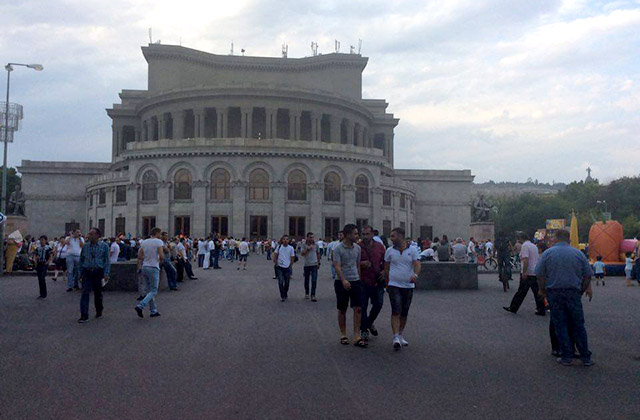
Dried parts of juicy promises

This election campaign differs from the previous ones. It varies not only by amended Constitution, but by the very content of the campaign.
First, pre-election programs of the political parties and their economic components are more stressed and discussed. The first to introduce its 15 economic priorities was “Tsarukyan” alliance and social networks immediately discussed its being grounded and realistic.
After March 5 the other 8 political powers issued their pre-election programs and they were also discussed. Besides social networks program provisions have been covered in other formats as well: TV debates, discussions with media outlets and through social organizations (e.g. debate of “Pressing” Club under “168 Hours” newspaper and the event launched by Konrad Adenauer Stiftung (KAS) foundation).
There are views that the society is mainly out of these topics and in-depth discussions of the programs and they aren’t interest. However, social network users and those interested in economic newsfeed also comprise a part of the electorate (although not so big) and an active discussion hasn’t been launched yet.
However, the most noteworthy isn’t that. It’s the point that more lively are discussed the programs and promises not of RPA, but other political parties. In particular, they demand explanations from the parties giving juicy promises regarding how they’re going to be implemented. For instance, when one promises to rise pensions and salaries, on the other hand, reduce taxes, they ask: how will the budget overcome this?
More conceptual questions are heard as well around promises pleasant to the ear, however, no one focused on why it’s correct doing that. For instance, some political powers promise to eliminate speedometers and cameras, others propose eliminate accumulative pension system, the third—leave EEU and integrate into the EU. It seems there is no doubt that these promises are positive and close to the public heart. However, a question arises: why? What benefit and damage will that step give? And it turns out that everything isn’t so definite.
For the sake of justice it should be stated that arguments brought by the opposition are weak, and sometimes it turns out that there are no specialized grounding and calculations under that program provision. For instance, they didn’t do analysis how they’re going to bring into life their proposed step, how much additional resource will be required, what’s the source of that resource, what influence that step may have, in which period and which the side effects will be and etc.
For this very reason some qualify pre-election provisions and promise of the opposition as populism, i.e. they blame in deliberate cheating of the electorate via unrealistic promises.
In fact, it isn’t so. Of course, there are some powers, in case of which populist inclinations are tested by experience. Also there are cases, when obviously unrealistic promises are given, being convinced that they won’t face the demand for making them a reality, so why don’t promise the impossible?
However, also there are cases, when the opposition power is sure in productivity of the steps it states. They make some allegations based on not deep analysis or even on intuitive level, and in response to the question whether there is specialized analysis, they either reply positively, however, they don’t provide the analysis, or sincerely reply that they’ll do it later, when they come to power.
However, it isn’t correct blaming the opposition. To write an in-depth, scientifically grounded invulnerable program a think-tank should work for a few months. That work should be implemented either by personal resources, through member specialists of the party, or by outsourcing—ordering analysis to any specialized organization. The first option is the very basis for shadow government, when there are specialists of every field in the opposition team, who have their developed program and vision, perfectly know the figures and developments and are ready to assume country’s governance at any moment. Greater part of our opposition doesn’t possess such specialized resources. They also don’t possess financial resources to order the work to others.
Moreover, greater part of opposition blocs has been developed 2-3 weeks before the election campaign. It’s a rather short period not only to develop a joint vision and develop a grounded program.
That’s why opposition programs are vulnerable regarding arguments. The program of “Free Democrats” is distinguished in this regard, as it was developed by the economic laboratory of former PM Hrant Bagratyan. Moreover, not in a few days, but supposedly those 133 points have been developed earlier, than he decided to take part in the elections within that bloc. Thus, “Free Democrats” has a comprehensive program. However, in the period of recent 5 years the government gave negative conclusion to the very drafts authorized by Hrant Bagratyan, bringing economic anti-arguments.
It’s another issue why the situation is this and why the opposition is weak.
In this regard RPA is in the most vulnerable position. RPA (or the government) has worked on the program for entire state system, including professional resources of all ministries. And with all this the program of RPA is rather cautious, there were no promises on influential economic growth, on considerable growth of salaries, and etc. Thus, the most populist program is that of RPA.
As a result of this, a strange situation has been established. RPA with its pre-election program and economic provisions, seems to be out of sight. Almost no one asks the leading political party which part of promises heard in 2012 has been implemented, or why should the electorate vote for a party providing zero growth in agriculture.
Instead programs of the opposition are in the focus of attention, covered by experts, reporters and other opposition powers. A more enviable situation couldn’t have been imagined for the leading political party. Enviable to the degree that RPA even doesn’t reflect to those giving unrealistic promises, allowing that others covered them, and it calmly leads its “glamorous” campaign.
By Babken Tunyan

























